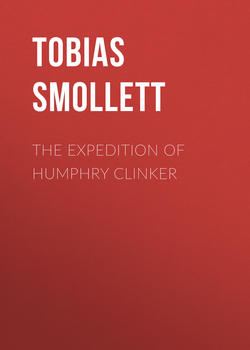Читать книгу The Expedition of Humphry Clinker - Tobias Smollett - Страница 31
THE EXPEDITION OF HUMPHRY CLINKER
To Dr LEWIS
ОглавлениеDEAR DOCTOR,
London is literally new to me; new in its streets, houses, and even in its situation; as the Irishman said, ‘London is now gone out of town.’ What I left open fields, producing hay and corn, I now find covered with streets and squares, and palaces, and churches. I am credibly informed, that in the space of seven years, eleven thousand new houses have been built in one quarter of Westminster, exclusive of what is daily added to other parts of this unwieldy metropolis. Pimlico and Knightsbridge are now almost joined to Chelsea and Kensington; and if this infatuation continues for half a century, I suppose the whole county of Middlesex will be covered with brick.
It must be allowed, indeed, for the credit of the present age, that London and Westminster are much better paved and lighted than they were formerly. The new streets are spacious, regular, and airy; and the houses generally convenient. The bridge at Blackfriars is a noble monument of taste and public-spirit.—I wonder how they stumbled upon a work of such magnificence and utility. But, notwithstanding these improvements, the capital is become an overgrown monster; which, like a dropsical head, will in time leave the body and extremities without nourishment and support. The absurdity will appear in its full force, when we consider that one sixth part of the natives of this whole extensive kingdom is crowded within the bills of mortality. What wonder that our villages are depopulated, and our farms in want of day-labourers? The abolition of small farms is but one cause of the decrease of population. Indeed, the incredible increase of horses and black cattle, to answer the purposes of luxury, requires a prodigious quantity of hay and grass, which are raised and managed without much labour; but a number of hands will always be wanted for the different branches of agriculture, whether the farms be large or small. The tide of luxury has swept all the inhabitants from the open country—The poorest squire, as well as the richest peer, must have his house in town, and make a figure with an extraordinary number of domestics. The plough-boys, cow-herds, and lower hinds are debauched and seduced by the appearance and discourse of those coxcombs in livery, when they make their summer excursions. They desert their dirt and drudgery, and swarm up to London, in hopes of getting into service, where they can live luxuriously and wear fine clothes, without being obliged to work; for idleness is natural to man—Great numbers of these, being disappointed in their expectation, become thieves and sharpers; and London being an immense wilderness, in which there is neither watch nor ward of any signification, nor any order or police, affords them lurking-places as well as prey.
There are many causes that contribute to the daily increase of this enormous mass; but they may be all resolved into the grand source of luxury and corruption—About five and twenty years ago, very few, even of the most opulent citizens of London, kept any equipage, or even any servants in livery. Their tables produced nothing but plain boiled and roasted, with a bottle of port and a tankard of beer. At present, every trader in any degree of credit, every broker and attorney, maintains a couple of footmen, a coachman, and postilion. He has his town-house, and his country-house, his coach, and his post-chaise. His wife and daughters appear in the richest stuffs, bespangled with diamonds. They frequent the court, the opera, the theatre, and the masquerade. They hold assemblies at their own houses: they make sumptuous entertainments, and treat with the richest wines of Bordeaux, Burgundy, and Champagne. The substantial tradesman, who wont to pass his evenings at the ale-house for fourpence half-penny, now spends three shillings at the tavern, while his wife keeps card-tables at home; she must likewise have fine clothes, her chaise, or pad, with country lodgings, and go three times a week to public diversions. Every clerk, apprentice, and even waiter of tavern or coffeehouse, maintains a gelding by himself, or in partnership, and assumes the air and apparel of a petit maitre—The gayest places of public entertainment are filled with fashionable figures; which, upon inquiry, will be found to be journeymen taylors, serving-men, and abigails, disguised like their betters.
